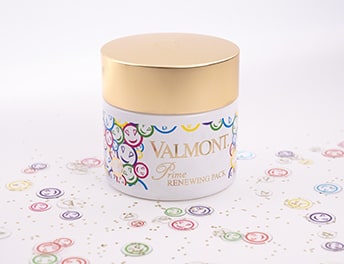In the world of luxury skincare, Valmont is synonymous with excellence and innovation. But what truly sets this Swiss beauty giant apart is its unwavering commitment to a cause that transcends the world of cosmetics: the protection of our precious pollinators, the bees. Since 2017, Valmont has been on an incredible journey alongside Stéphanie Vuadens, a Swiss beekeeper and the visionary founder of "Arches des Abeilles." Together, they embarked on a mission to create 20 Geneva-based beehives, whose magical ingredients now form the heart of Valmont's remarkable Essence of Bees collection.
But Valmont's dedication doesn't stop at the Swiss border. In 2023, they expanded their mission by joining hands with four non-profit organizations, each chosen with a specific focus on preserving bees and their ecosystems on a global scale. This profound commitment is sealed with a promise: a portion of the proceeds ($20) from every Essence of Bees product sold will be channeled into four distinct projects led by these partners, all dedicated to safeguarding the future of bees and their habitats.
In North America, Valmont has chosen to join forces with Pollinator Partnership, a remarkable organization dedicated to nature’s unsung heroes. We had the pleasure of sitting down with Kelly Bills, a dedicated advocate for these vital creatures and Executive Director at Pollinator Partnership. Founded 25 years ago, this nonprofit organization has a mission that revolves around promoting the health of pollinators and the ecosystems they inhabit.
But what sets them apart is not just their dedication to the cause, it's their ability to forge meaningful partnerships that make a real difference. Here at Valmont, we have a deep appreciation for the honeybee’s invaluable role, and back in 2017, we approached Pollinator Partnership with a desire to give back to the very bees that enriched our Essence of Bees products with honey, propolis, and royal jelly.


Fast forward to today, Valmont is once again joining forces with Pollinator Partnership, further cementing our dedication to safeguarding pollinators. This time, we're not just supporting honeybee health; they're taking a broader stance by contributing to pollinator research grants. These grants will play a pivotal role in addressing the multifaceted threats that pollinators face, from pesticides and pests to habitat loss and the relentless specter of climate change.
Join us as we explore their shared commitment to the preservation of pollinators, the critical role these creatures play in our world, and how this partnership is set to make a significant impact on the future of our planet. Now let’s delve into the world of pollinators, their critical role in our lives, and how Pollinator Partnership is working tirelessly to ensure their well-being.


A MUTUAL RELATIONSHIP
"Pollinators Need You. You Need Pollinators." This catchy phrase encapsulates the essence of the relationship between humans and pollinators. As Kelly Bills eloquently puts it, pollinators facilitate the reproduction of plants through pollination, which, in turn, directly impacts our daily lives. One out of every three bites of food in a Western diet is made possible by pollinators, a staggering statistic that underscores their significance. But it's not just about sustenance. Pollinators also contribute to the diversity and enjoyment of our diet, ensuring that we continue to savor delicious treats like chocolate and coffee.
However, their role extends far beyond the dinner plate. By creating and maintaining habitats, pollinators provide essential ecosystem services, including erosion control, water filtration, carbon sequestration, and even the control of invasive species. In short, they are the unsung heroes that keep our planet healthy and thriving.
A MULTITUDE OF POLLINATORS
When we talk about pollinators, we often picture the European honeybee buzzing around flowers. However, the world of pollinators is incredibly diverse, featuring a wide array of species, each with its unique characteristics and role in the pollination process. Kelly Bills sheds light on this diversity, mentioning the approximately 20,000 species of bees worldwide, 4,000 of which call North America home.
Native bees, unlike their honeybee counterparts, often lead solitary lives and inhabit various habitats, from the ground to trees and even hollowed-out stems. The pollination process isn't exclusive to bees; it involves birds, bats, butterflies, beetles, and even moths, which typically pollinate at night. In tropical regions, you'll find mammals and reptiles, further illustrating the richness of this intricate web of life.


THE ECONOMIC IMPACT OF POLLINATORS
While pollinators play a pivotal role in our daily lives, their economic contributions often go unnoticed. Kelly Bills explains that the importance of pollinators goes beyond what's on our plates. For instance, almonds, a beloved snack, would cease to exist without animal pollinators like bees. Likewise, wine grapes, while capable of self-pollination, thrive and yield larger fruit when visited by pollinators.
The economic ramifications of pollinators are staggering. Globally, billions of dollars are contributed to the economy through animal pollination, and in the United States alone, honeybees contribute nearly 20 million dollars annually. These figures underscore the vital role of pollinators in our agricultural and economic systems, which ripple out to impact our daily lives.
EDUCATING FOR A SUSTAINABLE FUTURE
At the heart of Pollinator Partnership's mission lies education. To increase public awareness about the importance of pollinators and their conservation, the organization engages in a myriad of initiatives. They create educational resources, including annual posters featuring stunning artwork that focuses on different pollinator topics. They also organize National Pollinator Week each June, supporting local events, native plant sales, and beekeeping classes to foster a deeper understanding of these crucial creatures.
Moreover, Pollinator Partnership collaborates with local communities and farmers to enhance pollinator habitats. One noteworthy project is Project Wingspan, which trains volunteers to collect native seeds, grow plants, and redistribute them to conservation projects. This initiative has already impacted over 200,000 acres of habitat, a testament to the power of community-driven efforts.
HOW TO GET INVOLVED
Kelly Bills emphasizes that everyone can contribute to pollinator conservation. The simplest and most effective way is by planting pollinator-friendly plants, even in the smallest of spaces. Whether you have a window box or a vast garden, selecting native or non-invasive plants ensures that your greenery supports local pollinators.
In addition to planting, being mindful of pesticide use is crucial. Reducing or eliminating pesticide use helps protect these vital insects. Education, sharing knowledge about pollinators, and organizations like Pollinator Partnership, is another impactful way to contribute to their conservation.


In conclusion, the partnership between humans and pollinators is a symbiotic one. As we benefit from the fruits of their labor, it's our responsibility to protect and support these essential creatures. Thanks to organizations like Pollinator Partnership, the seeds of awareness and conservation are being sown, ensuring that this vital partnership continues to flourish. So, remember: Pollinators Need You, and You Need Pollinators. It's a partnership worth nurturing.























Share this article